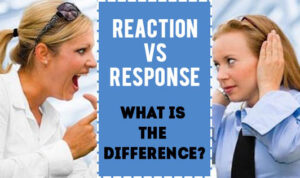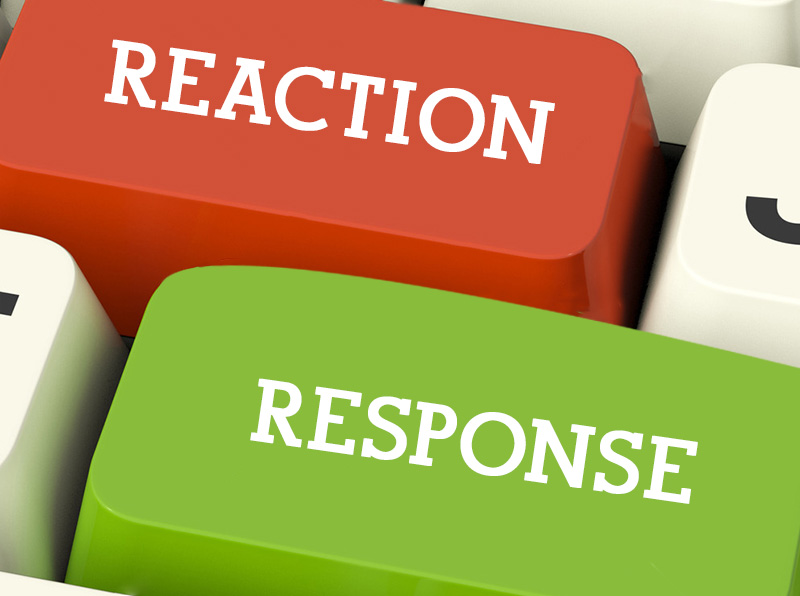Contents
Reaction vs Response
 A response is when someone carefully considers a situation before responding. A reaction, on the other hand, is when someone responds immediately after something happens, with no time to consider it. This can be because they do not want to think about the consequences of their actions or if they cannot understand what has happened and so avoid thinking about it. So reaction vs response both are
A response is when someone carefully considers a situation before responding. A reaction, on the other hand, is when someone responds immediately after something happens, with no time to consider it. This can be because they do not want to think about the consequences of their actions or if they cannot understand what has happened and so avoid thinking about it. So reaction vs response both are
Both reactions and responses can be positive or negative, depending on the situation. For example, if someone reacts positively to a new opportunity, that is a good reaction. However, if someone responds negatively to a new opportunity, that is not such a good reaction. On the other hand, if someone reacts negatively to something bad that has happened, that is a negative reaction. However, if someone responds positively to something bad that has happened, that is still a good reaction.
It is important to remember that our reactions are based on our emotions and the way we interpret the situation. Our responses, on the other hand, are based on our values and beliefs. We can take our time to respond to a situation, rather than reacting impulsively.
Reaction vs Response In Business
 When it comes to the world of business, having a good reaction is just as important as having a good response. In fact, in some cases, your reaction may even be more important than your response. A good reaction can show that you are passionate about your work, that you care about your customers, and that you are willing to go the extra mile for your team. On the other hand, a bad reaction can show that you are unprofessional, unresponsive, and unwilling to put in the effort needed to succeed.
When it comes to the world of business, having a good reaction is just as important as having a good response. In fact, in some cases, your reaction may even be more important than your response. A good reaction can show that you are passionate about your work, that you care about your customers, and that you are willing to go the extra mile for your team. On the other hand, a bad reaction can show that you are unprofessional, unresponsive, and unwilling to put in the effort needed to succeed.
So how can you make sure that you always have the best reaction possible? Here are a few tips:
- Stay calm and professional. No matter what happens, don’t let your emotions get the best of your reaction.
- If you’re not happy with something, tell your manager or co-workers right away. Don’t wait until later to voice your opinions.
- Think before reacting. You want to make sure that you are responding rather than simply reacting at the moment because if you think first, then you will be able to give a more thoughtful response.
- Take a step back. If you’re feeling overwhelmed or frustrated, take a few minutes to clear your head and then come back with a more composed reaction.
Reaction vs Response In Sports
In the world of sports, the difference between a good reaction and a bad reaction can be the difference between winning and losing.
A good reaction can show that you are quick to move, versatile enough to tackle multiple problems at once, and willing to take the extra mile for your team. On the other hand, a bad reaction can show that you are slow on your feet, unable to think clearly during tough situations, and unwilling to help out your teammates.
So how can you make sure that you always have the best reaction possible? Here are a few tips:

- Stay calm and focused. No matter what happens, don’t let your emotions get in the way of your reaction.
- If something doesn’t go your way, don’t get discouraged. Learn from your mistakes and go from there.
- Always think before you act. You want to make sure that you are responding rather than simply reacting at the moment, because if you think first, then you will be able to give a thoughtful response.
- Stay calm and don’t rush yourself. If your adrenaline is pumping too much or your heart is racing, take a few deep breaths and then react.
How To Get The Most Out Of Your Reactions?
While it’s important to have a good reaction in all aspects of life, it’s especially important when it comes to parenting. After all, your children are constantly watching you and taking cues from your reactions. Here are a few tips for getting the most out of your reactions:
- Always be aware of your reactions. You want to make sure that you are in control of your reactions, rather than letting your emotions get the best of you.
- React with love. When you react with love, your children will feel safe and secure, which is essential for their development.
- React with patience. When you react with patience, your children will learn how to handle difficult situations in a calm and composed manner.
- React with understanding. When you react with understanding, your children will feel like they can come to you with anything and that you will be there to listen.
Reaction Vs Response For Children

Reacting with love, patience, and understanding helps parents raise healthy, happy kids—but it can be tough to always react this way. Here are a few more tips for getting the most out of your reactions:
– React with love. When you react with love, it helps your child feel safe and secure. This is the most important thing for children, as they need to feel loved in order to thrive.
– React with patience. Sometimes, reacting with patience is the harder thing to do, but it’s so important for kids. They need to know that you’re in control and that they can trust you to be there for them.
– Try not to overreact. Overreactions don’t help your child, and may even make them feel bad about themselves or create other problems in the future. It takes practice to react to situations calmly, without overreacting—but it’s definitely worth it!
– Try not to underreact. Underreacting also doesn’t help and can leave children feeling confused, scared, or upset.
– Remember that reactions are part of a system. Your child’s behavior is not isolated; it has implications for the whole family system (relationship between parent/caregiver and child). So, look at your own feelings and recognize how they might be connected to your child’s behavior.
– Be flexible. Every family is unique, with different needs, timetables, and rhythms. So try not to let your assumptions about what works for everyone else limit you. Focus on what the situation is at hand, rather than what you think it should be like.
– Remember that your child’s behavior is not personal. Children are always learning, so what they do now is not a reflection on how much they love you or how good of a parent or caregiver you are.
– Be persistent. Changing any behavior takes time and practice, so be patient with yourself and with your kids as they learn new ways to react.
When it comes to reactions, parents have a lot of power. By reacting with love, patience, and understanding, parents can help their children learn how to handle their emotions in a healthy way. This sets kids up for a lifetime of positive relationships and helps them thrive both emotionally and mentally. So, try to remember that your reactions can have a big impact on kids—and that time and practice really do make a difference.
How To Respond When You’re Angry?

Here are some helpful tips for dealing with difficult emotions:
1. Recognize that your feelings are valid and temporary. Children should know that their feelings are normal and acceptable. If children believe they shouldn’t feel a certain way, they’ll keep trying to suppress their emotions, which can lead to misbehavior.
2. Use “I” statements when you’re upset. Expressing yourself in an accusing way will only put your child on the defensive. Instead of saying, “You are so loud and impatient,” say something like, “When I get scared during a thunderstorm, I feel scared and I need some quiet.” Then let your child know what you would like to see instead, such as “I’d like it if you could play quietly with your toys while there’s a storm outside.”
3. Help kids understand that emotions are separate from behavior. Instead of saying, “Don’t get mad,” explain that getting mad is one of many options children have when they feel frustrated or scared. Instead, you could say something like, “I know it’s hard to wait, but it helps to take a deep breath and count to three before we leave the house.”
4. Redirect their attention away from the negative behavior. For example, if you have a child who frequently interrupts you when you’re on the phone, have her help you with a chore. So she’s not tempted to bug you.
5. Set a good example for how your children should handle their emotions and encourage them to talk about their feelings by sharing their own when appropriate. Your kids won’t have all the answers right away and may not know how to express themselves. It’s okay to tell your child that you’re not sure what to do and need some time to think about it but try not to get stuck in a pattern of hurting each other through anger or frustration.
6. Give kids choices when appropriate, such as “Do you want to play with the blue truck or the green one?” This will help them feel empowered and in control.
It’s also important to remember that kids will make mistakes. When they do, it’s important not to get angry or frustrated, but to calmly explain why the behavior was wrong and what the consequences will be.
The best way to deal with anger is not to react to it in the heat of the moment, but to take some time to calm down. This might mean taking a walk, listening to music, or just focusing on your breath. Once you’ve calmed down, you can start thinking about how to respond in a way that will be helpful.
Conclusion
When something happens, we have a choice in how to react. We can choose to have a positive or negative reaction. Our reaction is usually based on our emotions and the way we interpret the situation. A response, on the other hand, is a more considered reaction that is based on our values and beliefs. We can take our time to respond to a situation, rather than reacting impulsively. Both responses and reactions can be positive or negative, depending on the situation.
A response is a considered reaction that is based on our values and beliefs. This contrasts with a reaction that is often emotional and impulsive in nature. A response may take longer than a reaction but it allows more time to consider the situation.
If you are looking for affordable Online Counseling MantraCare can help: Book a trial therapy session


